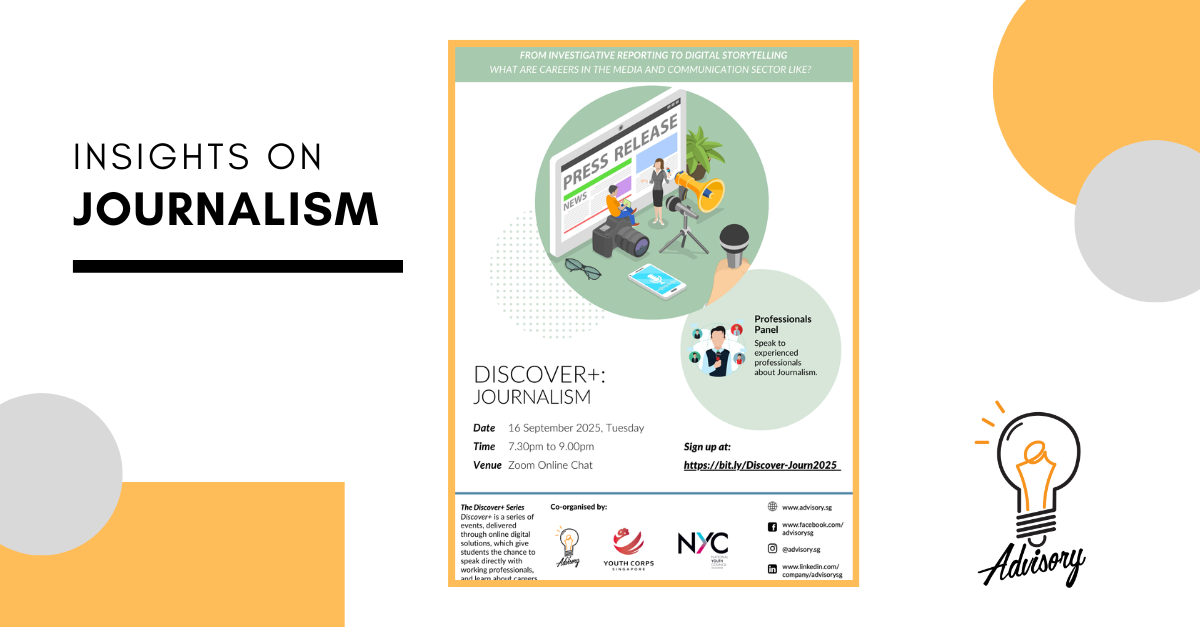Insights on Journalism

By Nisar Keshvani (Moderator)
Discover+ is a series of online industry panels which gives students the chance to interact with working professionals and learn about the careers they aspire to enter. These panels provide youths and working professionals with the opportunity to better understand industry trends, hear first-hand perspectives from industry professionals, and gain valuable advice on entering or navigating these industries.
On 16 September 2025, Advisory hosted Discover+: Journalism, the 99th edition of the Discover+ series. Speakers on the panel included:
- Kelly Ng, Asia Journalist, BBC News
- Shefali Rekhi, Director and Editor of Asia News Network (ANN), The Straits Times
- David Ramli, Asia Investing Journalist, Bloomberg News
- Nisar Keshvani, Asst Dean (Communications & Public Affairs), Northwestern University in Qatar - Moderator
Attendees included students at various levels of education with a desire to understand more about journalism, the writing profession, and how to best position themselves for such roles. Below are some key points shared during the session:
How is the industry landscape and market dynamics changing?
Traditional revenue streams are shrinking. Once-lucrative print advertising has been replaced by digital ads that yield cents on the dollar, while the cost of producing journalism continues to rise. Lawsuits and reputational risks add further pressure, even as AI-driven content farms flood audiences with fast, shallow copy.
This squeeze is pushing media organisations to rethink sustainability. Some models rely on cross-subsidising quality journalism with premium services; others experiment with subscription-based, niche-focused offerings. Lower entry costs on digital platforms are also creating space for specialised outlets that serve highly targeted communities.
Audiences, meanwhile, are overwhelmed. Where once people consumed a few hundred pieces of news per year, today they encounter thousands daily. The challenge has shifted from access to discernment: separating the credible from the catchy, the trustworthy from the viral. For journalists, the implication is clear — success requires both breadth of knowledge and deep specialisation, along with the creativity to capture attention without sacrificing integrity.
What does a career in journalism look like today?
For those entering the field, journalism remains both demanding and deeply fulfilling. It is not a profession built on shortcuts. Curiosity, perseverance, and adaptability are the defining qualities of long-term success.
The career path is rarely linear. Journalists may begin as generalists, move into editorial or leadership roles, or branch into audience engagement, social media, or policy-related positions. Others step away to balance personal priorities, yet the skills developed — synthesising complexity, asking hard questions, telling stories with clarity — transfer powerfully into adjacent fields like communications, public affairs, and strategy.
The rules of the game are also changing. Articles that once ran to 2,000 or 3,000 words are now constrained to 750–1,200. To thrive, journalists must sharpen their storytelling, delivering depth with economy. This requires not only technical skill but also clarity of purpose — a sense of why the work matters and for whom.
What skills define good journalism?
Writing remains central, but the profession rewards more than polished prose. The real skills of journalism lie in observing nuance, asking the right questions, verifying facts, and presenting multiple perspectives.
Persistence is critical. Leads often dry up, doors go unanswered, and promising stories collapse under scrutiny. The best journalists are those who pivot, dig deeper, and keep pursuing the truth. Credibility comes from rigor: cross-checking sources, maintaining relationships across industries and communities, and being open to feedback and correction.
Trust is fragile, but it compounds over time. Meeting deadlines, delivering consistent coverage within a beat, and maintaining integrity in sourcing all build reputation. The maxim still holds: you are only as good as your last byline.
How should journalists navigate public relations (PR)?
Journalists and communications professionals often work in tension but are bound by mutual reliance. Reporters field dozens of PR pitches daily, most of which are irrelevant or inflated. What distinguishes a credible pitch is an understanding of audience needs, timeliness, and truthfulness. Relationships built on honesty and trust — cultivated long before moments of crisis — ensure access to sources when it matters most.
What lies ahead for the future of journalism?
Looking ahead, the future of journalism will not be determined by technology alone. The enduring test will be whether practitioners continue to uphold credibility and ask the hard questions. In a media environment flooded with content, audiences still seek accuracy to guide decisions about safety, politics, health, and daily life. The survival of journalism as a public trust depends on its ability to meet that need — fearlessly and consistently.
How do we prepare the next generation of journalists?
At its heart, journalism is not only a career but also a public service. Preparing the next generation means exposing students to both its challenges and opportunities: the fast pace, the unpredictability, the need for resilience and curiosity. Mentorship, internships, and community-driven programs provide vital pathways for aspiring journalists to build credibility and confidence.
For those considering this profession, the advice is simple but profound: keep showing up. Write, research, verify, and publish. Build relationships across society. Outdo yourself with each new story. Journalism demands much — but for those with the passion to serve society through truth-telling, it offers purpose, fulfillment, and the chance to shape informed communities.



